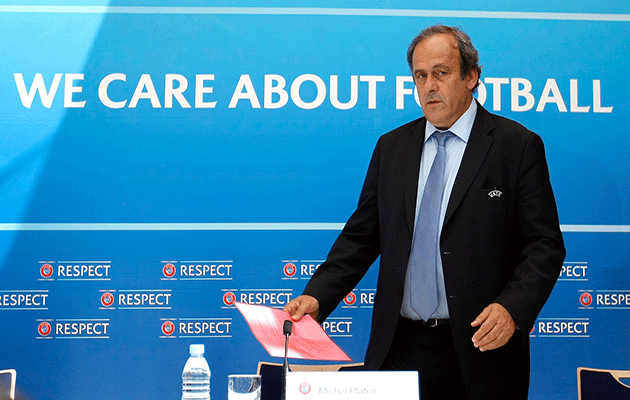Michel Platini is serving out his last term of president of European federation UEFA, whether or not he wins the vote next February 26 to take over at world governing body FIFA.
The 60-year-old Frenchman told a news conference here that his destiny “is clear one way or the other.” Otherwise Platini refused point-blank to discuss his FIFA candidacy on the grounds that the past two days have been all about European club competitions.
Initially Platini had let it be known that this would be the occasion on which he would present his manifesto in pursuit of the Sepp Blatter succession when the 79-year-old Swiss steps down as FIFA supremo at an extraordinary elective congress next February 26.
However, even though media representatives had flown in like “seagulls following the trawler” – to quote fellow Frenchman Eric Cantona – Platini had no sardines to offer.
Perhaps significantly his change of heart, or strategy, followed the controversy over anti-Platini leaks alleged to have emanated from within FIFA. He was not prepared to fall into the same trap and lay himself open to an accusation of employing UEFA resources to his own electoral advantage.
He said: “This is a UEFA event. It’s UEFA tournaments we have been talking about here in Monaco so it’s not the right time to talk about FIFA.
“I have been a candidate for the FIFA presidency since July 27 and the elections are in six months’ time so there is plenty of time to talk about that.”
Later he concluded what was not so much a press conference more a UEFA promotional seminar by saying: “I know why you all came. I’m sorry for not replying to your questions [about FIFA] but we will have time. This wasn’t the right time or place. I apologise for not having replied to all your questions.”
The one fresh contribution about political issues was Platini’s statement that this, his third term as UEFA president, would also be his last.
After referring to his destiny – either as victorious president of FIFA from February 26 or as a vanquished continuing president of UEFA, Platini said: “I’m stopping there” – meaning at the end of his current mandate in 2019. Questioned further he added mischievously: “I may support a limit to terms in office as president in general.”
The issue of term limits is one which has been high profile ever since the first FIFA reform process was launched in 2011 and whose waters had been muddied, most observers believe, by UEFA’s own self-contradictory stance.
Platini might view the other topics discussed as evidence of how successful a president of UEFA he had been and, by implication, how sensible it would be for FIFA Congress to vote for him – rather than declared South Korean contender Chung Mong-joon or anyone else – next spring.
UEFA general secretary Gianni Infantino spelled out the progress towards “sanity” achieved by financial fair play in cutting club debts by 70pc over four years and revealed a more equably-balanced ratio share-out of a record Champions and Europa Leagues revenues (from 4.4:1 to 3.3:1).
Then Platini followed up by extolling all the positives of expanding the European Championship finals in France next summer from 16 teams to 24.
He even conceded that UEFA was studying whether it might usefully marry goal-line technology with his own preferred system of additional assistant referees.
The only cloud on the horizon was the difficult in imposing all the fair play demands of the ‘respect’ programme in terms of player misbehaviour -particularly in terms of mobbing a referee – and both on the pitch and in the stands.
UEFA has written to all the clubs in this season’s competition “with a goal of promoting of a spirit of fair play and upholding UEFA’s key values.”







